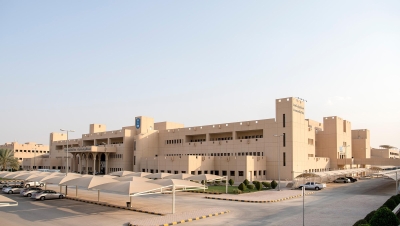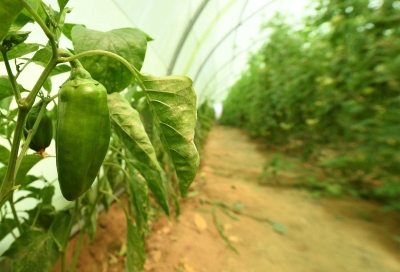
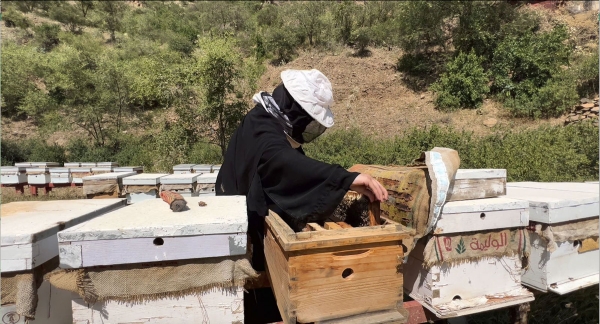
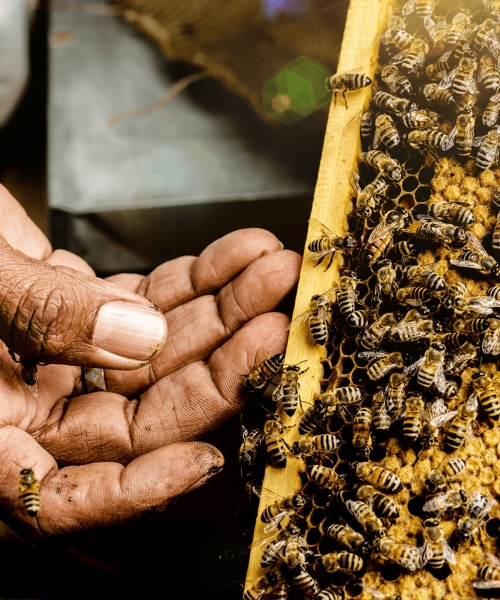
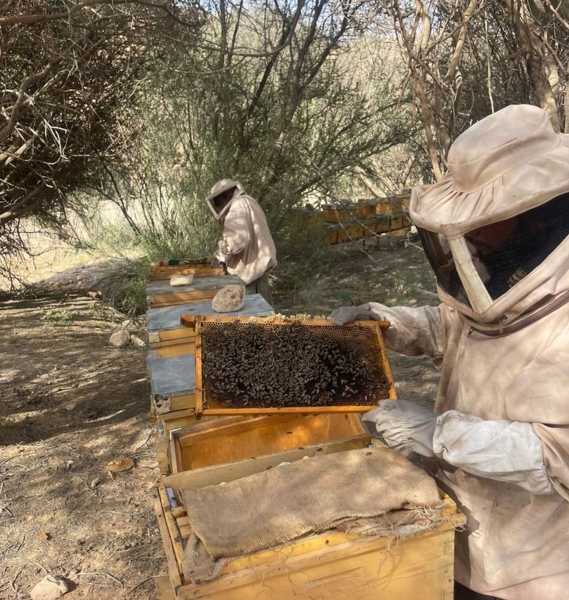
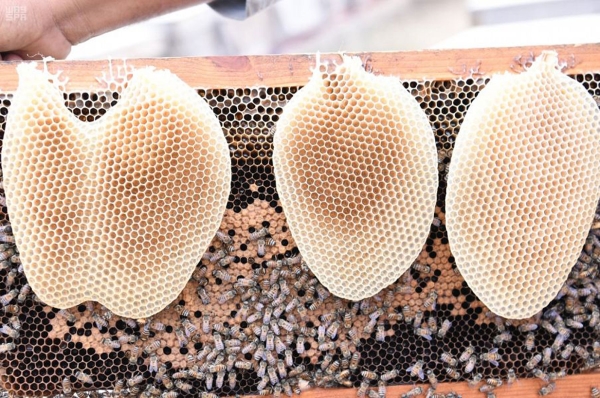
Beekeeping in the Kingdom of Saudi Arabia is a concept that refers to the care of bees and honey production in Saudi Arabia within dedicated colonies. It is typically made of wood and is known as beehives or apiaries. The person who practices beekeeping is called 'Al-Nahhal' (beekeeper).
One type of bee is the honey bee, which belongs to the genus 'Apis.' It produces honey and other food products, such as beeswax and pollen used for crop pollination.
Production volume of honey in Saudi Arabia
Due to the geographical diversity in Saudi Arabia, beekeeping has been practiced in many of its administrative provinces. Saudi Arabia produces over five thousand t of honey annually, and the number of beehives exceeds two million bee sects.
The National Agriculture Strategy has also contributed to the increase in the number of registered beekeepers with the Ministry of Environment, Water, and Agriculture, which now exceeds twenty thousand beekeepers.
Beekeeping spread in Saudi Arabia
Beekeeping is prevalent in Saudi Arabia's agriculturally fertile provinces such as Aseer, Al-Bahah, and Jazan.
The production activities of beekeepers in Saudi Arabia vary according to the changing seasons. During winter, beekeepers move their hives from mountain peaks to the Tihamah Plains to protect the bees from weather fluctuations. This migration also helps create a suitable environment for increased honey production due to the presence of specific trees characteristic of the Tihamah region, such as Al-Talh (Acacia tortilis), Al-Dharm (Lavender), Al-Tabaq (Dittrichia graveolens), Al-Sharam (Otostegia fruticosa), and As-Siha’ (Blepharis ciliaris). Additionally, species like Umbrella Thorn, As-Salam (Acacia ehrenbergiana), Ziziphus spina-christi, Ad-Dhian (Acacia asak), and As-Sayyal (Acacia johnwoodii Boulos) thrive in the region. The variety of these trees and their diverse environments, ranging from mountains to plains, plays a significant role in honey production.
Beekeeping in Aseer Province
Aseer Province stands out in the field of beekeeping due to its historical significance as a key production center for natural honey in Saudi Arabia. The mountain peaks of Aseer, known as Sarat Aseer, provide an optimal environment for beekeeping, particularly during summer, as the generally mild climate fosters a high density and diversity of flowering trees.
The expansion and advancement of beekeeping activities and techniques in Aseer Province have encouraged farmers and honey producers to cultivate new plant species known globally for their nectar-rich flowers, which attract bees and yield honeycombs among the most valuable due to their high nutritional content.
Beekeeping in Jazan Province
The diverse topography of Jazan Province has contributed to a wide variety of flora and the spread of trees along slopes and valley banks, creating an ideal environment for beehives. The province is renowned for producing various types of honey, including Ziziphus spina-christi, Astragalus, Acacia ehrenbergiana, Acacia tortilis, Ad-Doum (Hyphaene thebaica), Acacia asak, Acacia species, Al-Marar (Centaurea calcitrapa), Al-Majra (Hypoestes forskaolii), As-Siha’ (Blepharis ciliaris), and others.
The number of beekeepers in Jazan Province exceeds four thousand, with approximately 450,000 hives producing over fifteen types of honey, resulting in an average production of 450 t. The establishment of a queen bee production and swarm station is one of the key projects within the Sustainable Agricultural Rural Development Program 'REEF,' aimed at promoting local honey production, improving quality standards, enhancing the distribution of local bee strains, and upgrading techniques for higher productivity, lower costs, and better income while preserving the environment and natural resources.
Beekeeping in Al-Bahah Province
Beekeeping and honey production in Al-Bahah Province are traditional professions passed down through generations. The province's diverse vegetation between As-Sarat, Tihamah, and the desert supports these professions. This rich vegetation has contributed to the province's varied climate, fostering the spread of beekeeping activities and enabling many beekeepers to produce honey.
Al-Bahah produces about 20 percent of the total production in Saudi Arabia, which amounts to about one thousand t. The types of honey produced vary based on the vegetation cover, as Al-Bahah produces fifteen varieties of high-quality honey. The number of beekeepers in the province represents 16 percent of Saudi Arabia's beekeepers, which is about three thousand beekeepers, whether they are professionals owning over one thousand hives or amateurs owning a smaller number of hives, with an average of about one hundred hives each.
Government support for beekeeping in Saudi Arabia
Regarding government cooperation, several government entities support beekeeping in Saudi Arabia, such as the Ministry of Environment, Water, and Agriculture, the Beekeepers Cooperative Association, the Bee Research Unit, and Saudi Aramco. These bodies help beekeepers and promote beekeeping culture, launching initiatives like the National Capacity Building Studies Project. This project focuses on training Saudi youth to pursue beekeeping and honey production as a profession, a key initiative under the Human Capability Development Program in the framework of Saudi Vision 2030.
The Ministry of Environment, Water, and Agriculture is the primary governmental entity supporting beekeeping. It provides logistical and advisory services to approximately 8,800 beekeepers, who manage around 1.8 million beehives.
The ministry also provides extension services and educates beekeepers on modern beekeeping techniques through eleven demonstration apiaries across Saudi Arabia. Additionally, it supports queen bee breeding stations and nucleus colony production. Through the Beekeeping and Honey Production Development Initiative, the ministry runs several programs, including the Local Bee Strain Improvement and Conservation Program, the Bee Pasture Management and Protection Program, the Beekeeper Capacity Building Program, the Beekeeping Advisory and Scientific Research Development Program, and a bee protection program.
The ministry also works on developing and expanding the beekeeping sector through several programs and initiatives, including REEF and the Organic Farming Program. Additionally, it focuses on enhancing beekeepers' skills through specialized training courses and hosts model demonstration apiaries to promote advanced beekeeping techniques and best practices.
The Agricultural Development Fund, affiliated with the Ministry of Environment, Water, and Agriculture, offers financial support for stationary beekeeping through its finance sector. This initiative aligns with the fund's mission to provide credit services and collaborate with relevant authorities to support beekeepers. The fund also delivers technical, marketing, and training services to its clients under the financing program, aiming to cover the operational costs of licensed stationary beekeepers engaged in honey production.
Government efforts to support and develop beekeeping and honey production in Saudi Arabia also included establishing the Cooperative Association for the Development of the Beekeeping Industry in Riyadh, known as 'Al-Nahhal,' in 2015. Since its inception, the association has participated in several projects under the Ministry of Environment, Water, and Agriculture, such as the Saudi Agriculture Exhibition 2019. Additionally, it has collaborated on various initiatives with government educational entities, including King Faisal University.
Role of education in supporting beekeeping profession in Saudi Arabia
Faculty members in Saudi universities specializing in beekeeping have contributed significantly to research and projects to advance the profession and address its challenges. For instance, King Khalid University in Aseer established a dedicated bee research and honey production unit. This initiative aims to strengthen the university's scientific role in promoting beekeeping as a profession that helps achieve environmental balance and self-sufficiency in honey production.
Bee Research and Honey Production Unit
The Bee Research and Honey Production Unit at King Khalid University includes an applied research apiary, a honey product analysis lab, a bee disease diagnosis lab, a queen rearing lab, and a bee venom production lab. The unit has created job opportunities by equipping beekeepers with modern scientific methods to enhance beekeeping and honey production.
The Excellence Mark Project, launched by the Bee Research and Honey Production Unit at King Khalid University in Abha, was introduced alongside the growth of honey production and the flourishing beekeeping industry in Saudi Arabia. The project aims to combat widespread honey adulteration, one of the key challenges faced by beekeepers and local marketers in Saudi Arabia.
The Bee Research and Honey Production Unit also developed the Honey Standards Project in Aseer Province. The project aims to design a nectar-producing plant map of the province, compile a pollen atlas for nectar-producing plants, identify the botanical origins of honey, and set internationally recognized physical and chemical standards for honey. Additionally, it defines the chemical and physical properties of beeswax and bee venom in Aseer Province.
In the capital, Riyadh, the Bee Research Unit, affiliated with the Plant Protection Department at King Saud University's College of Food and Agricultural Sciences, was established as a center for scientific research in beekeeping in Saudi Arabia and beyond. The unit aims to advance the beekeeping industry in Saudi Arabia by developing scientific research and practical applications. The unit operates from two locations in Riyadh Province: one on the King Saud University campus and the other in Dirab, which serves as an applied research site equipped with all essential tools for honeybee farming and production. It also includes a research apiary and a dedicated room for honey extraction and production, along with other bee-related products.
Developing the beekeeping and honey production sector in Saudi Arabia
The Ministry of Environment, Water, and Agriculture has developed a plan to enhance the beekeeping and honey production sector in Saudi Arabia, aiming to achieve regional and global leadership. The plan focuses on advancing local beekeeping and honey production, elevating its economic value, and fostering industry growth. As part of this effort, several initiatives have been launched to preserve and protect the local bee strain, enhance the productivity of queen bees, colonies, and honey, and improve the overall efficiency of honeybee-related production.
The ministry has also supported approximately 10,500 beekeepers across Saudi Arabia through REEF. It directly funded the honey sector with SAR140 million and invested over SAR100 million in eleven projects nationwide. These efforts aim to sustain and develop the sector, empower Saudi beekeepers, localize the profession, and increase production.
The REEF program focuses on introducing modern systems and technologies for beekeeping and honey production. It also works on preserving and enhancing local bee strains to compete internationally. Through its Localization Initiative, it also localizes the profession and creates job opportunities, particularly for youth. This helps increase beekeepers' incomes and improve economic indicators.
In line with the ministry's efforts to localize beekeeping, it has trained 1,500 beekeepers from across Saudi Arabia and organized specialized training programs in beekeeping, product transformation, and marketing for over eight hundred beekeepers.
Furthermore, the ministry offers over thirteen services to beekeepers via the 'Naama' electronic services platform. These include issuing licenses, granting beekeeping permits, providing a mobile clinic for diagnosing bee diseases and pests, and offering training courses on beekeeping and honey production at regional agricultural training centers, among other services that support beekeepers.
Scientific events and conferences on beekeeping in Saudi Arabia
On the ground, national events and scientific conferences on beekeeping and honey production are organized, such as the Scientific Conference at the International Honey Festival, with the theme 'Best Practices and Experiences in Beekeeping to Achieve Saudi Vision 2030.' The event was organized by the Beekeepers Association in Al-Bahah in collaboration with the Ministry of Environment, Water, and Agriculture, supported by Al-Bahah University and the Cooperative Societies Council, featuring experts from the Food and Agriculture Organization (FAO), the International Federation of Beekeepers' Associations 'Apimondia,' the Arab Beekeeping Association (APIARAB), the Ministry of Environment, Water, and Agriculture, King Saud University, and the Agricultural Development Fund.
Related quizzes
